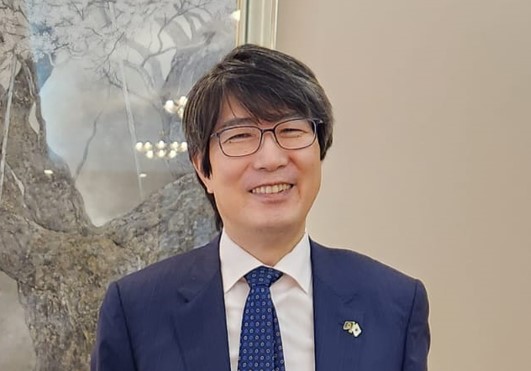
DHAKA, Sept 25, 2024 (BSS) - Japanese Ambassador to Bangladesh, IWAMA Kiminori, today reaffirmed Japan's readiness to support Bangladesh’s interim government’s needs during its ongoing transitional period .
“We are ready to engage with all stakeholders of the new government and the people of Bangladesh to assess what is required under the current structure. Our stance is to respond to the needs and requests of the new government and offer cooperation accordingly,” he said.
The Japanese envoy said this while lecturing at a seminar on ‘Bangladesh-Japan Relation’ organized by the Association of Former Ambassadors (AOFA) at the Foreign Service academy in the capital.
Kiminori underscored the need for Japan's commitment to assist Bangladesh in its reform initiatives, emphasizing cooperation to strengthen bilateral ties in key sectors, including business, defense, and people-to-people exchanges.
He also emphasized that Japan would align its efforts with the interests of its own society and the Japanese businesses operating in Bangladesh.
Presided over by AOFA President Ambassador Abdullah Al Hasan, the seminar was also addressed by Ambassador Gausul Azam and Ambassador Shahed Akhter.
Ambassador Farooq Sobhan, former Foreign Secretary also ambassador Masud Bin Momen and Professor Nailur Nahar from the Department of International Relations were among others present at the event.
Ambassador Kiminori highlighted that over 300 Japanese companies are currently operating in Bangladesh, none of which have decided to withdraw, despite security concerns during the transition period.
"For Bangladesh to continue its path toward becoming a prosperous society, more foreign investment is needed, including from Japan. To achieve this, the interim government needs to improve the business environment," he stated.
The envoy emphasized the need for Bangladesh to continue improving its business environment, noting that bureaucratic complicacy remains significant barrier to attract investment.
Kiminori reiterated Japan’s support for Bangladesh’s economic growth, noting that Tokyo remains committed to fostering trade relations and investment through the ongoing Public-Private Joint Economic Dialogue (PPED).
He also mentioned about ongoing negotiation with the Economic Partnership Agreement (EPA), aimed at enhancing bilateral trade and investment.
Japan has been a longstanding development partner of Bangladesh, and the two nations elevated their relationship to a strategic partnership.
As part of this strategic partnership, Japan has shifted from providing development assistance to facilitating trade and investment in Bangladesh.
In a recent move, the two countries exchanged notes for a 575 million yen grant under Japan’s Official Security Assistance (OSA) for further strengthening their economic cooperation.
The envoy highlighted the alignment of Japan’s Free and Open Indo-Pacific (FOIP) strategy with Bangladesh's Indo-Pacific Outlook, particularly in terms of inclusiveness and regional cooperation.
He emphasized the importance of peace, stability, and deepening economic ties for mutual prosperity in the region and beyond.
Touching upon internal security issues, Kiminori expressed optimism that the security situation in Bangladesh would stabilize soon, noting that Japan is closely monitoring developments and has communicated updates to its headquarters.
In terms of defense, Japan has supported initiatives to strengthen security cooperation between the two countries.
The ambassador mentioned Japan's role in facilitating visits to Bangladesh’s National Defense College and expressed Japan's intention to enhance collaboration in defense, security, and people-to-people exchanges.
Noting that people-to-people exchanges were identified as one of the key pillars of Bangladesh-Japan relations, Ambassador Kiminori stated that Japan remains committed to fostering closer ties through educational and cultural exchanges, as well as through initiatives such as the National Defense College tour.
The Japan External Trade Organization (JETRO)’s country representative in Bangladesh Yuji Ando also spoke on the occasion and stressed urgency for Japanese companies to explore and evaluate Bangladeshi market.
He urged the interim government to focus on reducing bureaucratic red tape, improving governance, and addressing issues such as corruption, all of which are critical to attract more investment.
Ando said this is the high time for Bangladesh to reset its business environment to attract more foreign investment.
He suggested that Bangladesh could streamline its government structure, pointing out that the country currently has 45 ministries, which may contribute to red tape.
As Bangladesh continues to navigate its transitional phase, Japan's steadfast commitment to its long-term partnership with Bangladesh offers a beacon of support in areas ranging from economic growth and defense cooperation to fostering closer people-to-people ties.
In recent years, both countries have taken steps to deepen their relationship upgraded the tie from comprehensive partnership to strategic partnership, reflecting their shared interests in regional stability, economic development, and security cooperation.
The ongoing negotiation for the Economic Partnership Agreement (EPA) further signals the commitment of both nations to expanding bilateral trade and investment opportunities.
As Bangladesh continues its transition under the interim government, Japan’s involvement will be crucial in shaping the country's economic and political landscape in the years to come.